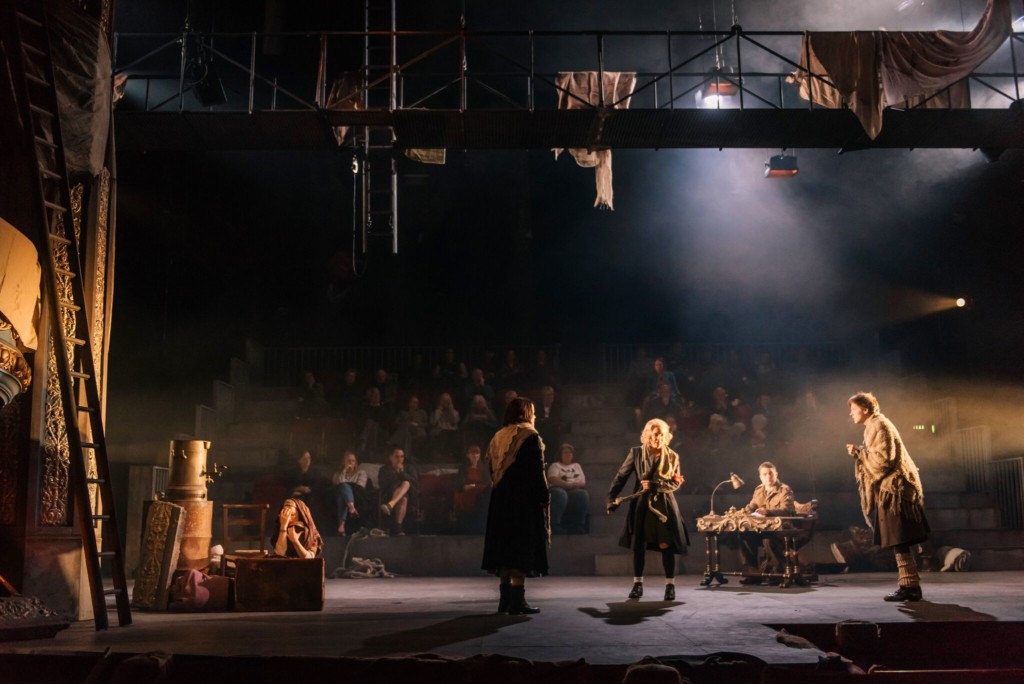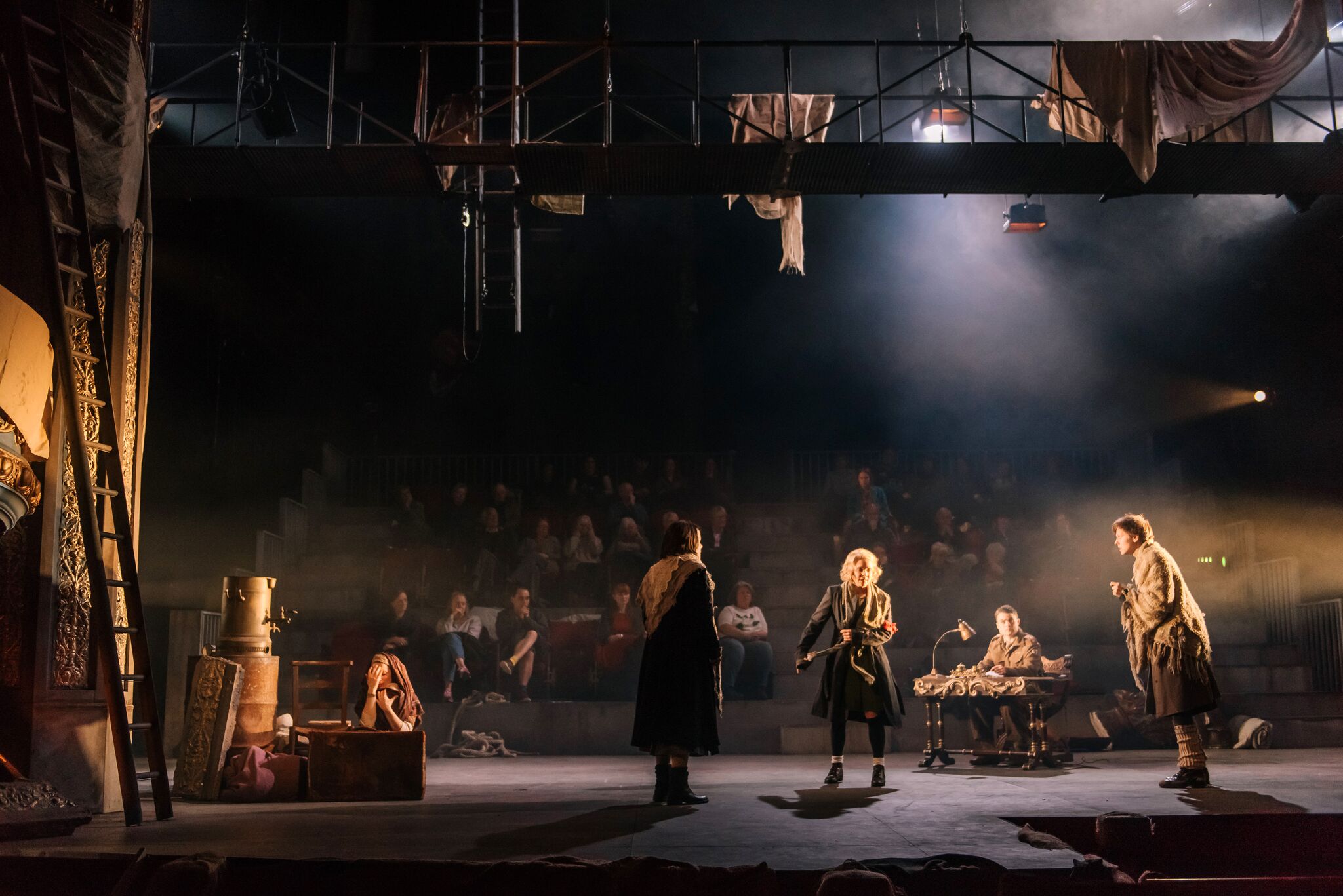
Cockpit
Walking across the stage to get to my seat, I pass a man holding his shaven head in his hands, who appears unwell. Sitting down to look at an unfamiliar view of the Lyceum – the auditorium slowly filling up seen from onstage, there are ladders leading off stage and up to the circle, and large hand-painted banners with edgy instructions such as ‘No Knives longer than 3 inches’ ‘No Firearms’ and ‘No Fighting’.
Cockpit is set in a theatre, being used as a makeshift sorting area for what the British Military calls DPs or ‘Displaced Persons’ in the Germany of 1945. The actors don’t just inhabit the stage – they move throughout the theatre – and the audience, seated both on stage and in the main auditorium, are addressed as the displaced of Europe.
It may be a shock to many to realise that there were still huge numbers of displaced human beings struggling both to survive and to get back to whatever might be left of their homes and countries for months and even years after the end of Word War II. And as we see from the simmering undercurrent of suspicion and violence, aptly highlighted by an early struggle over the ownership of a cooking pot, racial and national tensions are still running high.
The British Army are, nominally at least, in charge. A Glaswegian officer and Geordie Sergeant seem at the beginning to have control, but the frailty of their power, and their lack of any nuanced understanding of other nations and peoples is laid bare step by step in this quite starkly modern play, which was first staged in 1948 in London’s West End, but then disappeared.
The setting and themes of Brigitte Boland’s play are of course prescient in the age of Brexit. With millions of people displaced by war once again trying to survive and find a place in Europe and beyond, there are some lines that could have been written last week. A stark line hangs in the memory: “You don’t understand anything about Europe!”. The cast is wonderfully diverse in its nationalities and accents from Slovenia, Hungary, Poland, France and the UK. The haunting Polish and Romanian folk songs that first introduce, intersperse, and elegiacally round off the action bring all of the cast together like metaphorical glue for all of these human beings.
In theory, the task is simple – get those whose homelands are east of Germany in one convoy of trucks, and get those heading west in another. But then you discover that the Poles don’t want to go into Russian control, because they remember what the Russians did at the start of the conflict, when they were allies of Germany. And it’s also very clear that some at least also hate Jews. And the Lithuanians, Latvians and Estonians are also not too keen on finding out what ‘home’ has become under Soviet control. The Yugoslav Chetniks have a pathological distrust mutually shared by the Communists. The French are divided, with accusations of collaboration. The British don’t understand much of this. And nobody has any food.
These dispossessed people are broken and bitter, and regularly slide into violence – with a startling gunshot at one point causing visible shock to everyone in the theatre, and making the setting and the violence suddenly seem very, very real, with everyone in the theatre implicated. This is a dark exploration of the divisions of Europe, and the atmosphere changes abrubtly with the discovery of what is suspected to be an outbreak of bubonic plague, causing the theatre to be quarantined.
Albert Camus’ novel ‘The Plague‘ was, like this play, written around 1947, and the story of bubonic plague devastating the town of Oran in North Africa is often considered allegorical to the German occupation of France. And with the shared story of a state of quarantine, there is a similarity of more universal issues, and a better side of human nature is, for a time, revealed.
The British officer entrusts arms to those who were earlier disarmed to allow them to guard the theatre’s exits, and those who were earlier fighting over cooking pots are now working together to provide food for everyone, and to gather all the children from every nationality together for safety and protection. And there is a transformative stage show to keep spirits up, with a hastily but exquisitely staged and sung Opera aria from La Traviata, which makes you believe, just for a moment, that these desperate and traumatised people can rise above their divisions.
But even as the French farmer and a Pole swap stories about their cow herds, violence is never far away. The suspected plague is a mis-diagnosis – a British Medical Officer gives the all clear – and then things begin to slide towards chaos again, with hijacked lorries, violent accusations and a shocking, bloody murder taking place.
This is the core question that, first asked in 1948, and here again in 2017, makes this play so vital: are we going to come together in peace and work together, or fall apart into fractious argument and violence?
There is some comic relief with the German stage manager providing a number of moments of hilarity with his appearance from under the stage and his efforts at ‘disinfecting’ a child. All of the cast give authentic, gritty and credible performances, and they move fluidly around the theatre. But there is a harsh and brutal pessimism behind all of this about the divisions among people and the ways in which ‘belief’ is dangerous. You can argue for or against anything rationally if it’s viewed objectively, but you cannot argue against someone who simply believes in something. Belief is dangerous.
Viewing all of this from a raised position on stage puts a different perspective on one’s perception of the action – with actors sometimes squatting directly in front of you and jostling your legs as they interact with others who may be behind you. The sense of really being in the action, and being forced into close proximity with others is tangible, and for the audience watching from the traditional viewing stance in the auditorium, the sight of ordinary audience members on stage throughout the performance, and having actors walking, climbing and speaking all around them will have a similar effect.
The stagecraft that encompasses the whole theatre, even into the foyer, and a sense of immersion powerfully underline both the darkness and hope that Europe faced at this point in history. With the benefit of hindsight, looking back from 2017 with the knowledge we have about the creation of The United Nations and what became The European Union, the fall of Communism, and the reunification of Germany, we feel more optimistic – until we remember that we are probably standing at a similar tipping point in European history, with the labelling, corralling and perilous fate of ‘immigrants’ and ‘refugees’ and the tensions between nations and peoples evidenced by evolving situations in Crimea, Ukraine, Catalonia and Syria all come back into harsh perspective.
This is not a production that is easy to sit and simply ‘enjoy’ because it asks so many hard questions about human nature and about where we are heading in Europe. It makes its audience uncomfortable, not least because the reality of being in a theatre changes from one of being a spectator into being a participant – feeling literally like a displaced person. But it is a triumph as a piece of theatre, not least because it reminds us starkly that the wheel of history is depressingly circular and repetitive – and it is up to us to be involved one way or the other to turn it, because we are all locked into it together.
4 Stars
Lyceum Theatre, Edinburgh
19:30
Oct 6-28, Approximately 2 hours 20 minutes, includes one 20 minute interval.
Matinees Wednesday & Saturday 2pm from 11-Oct



[…] Cockpit October 11th, 2017 […]